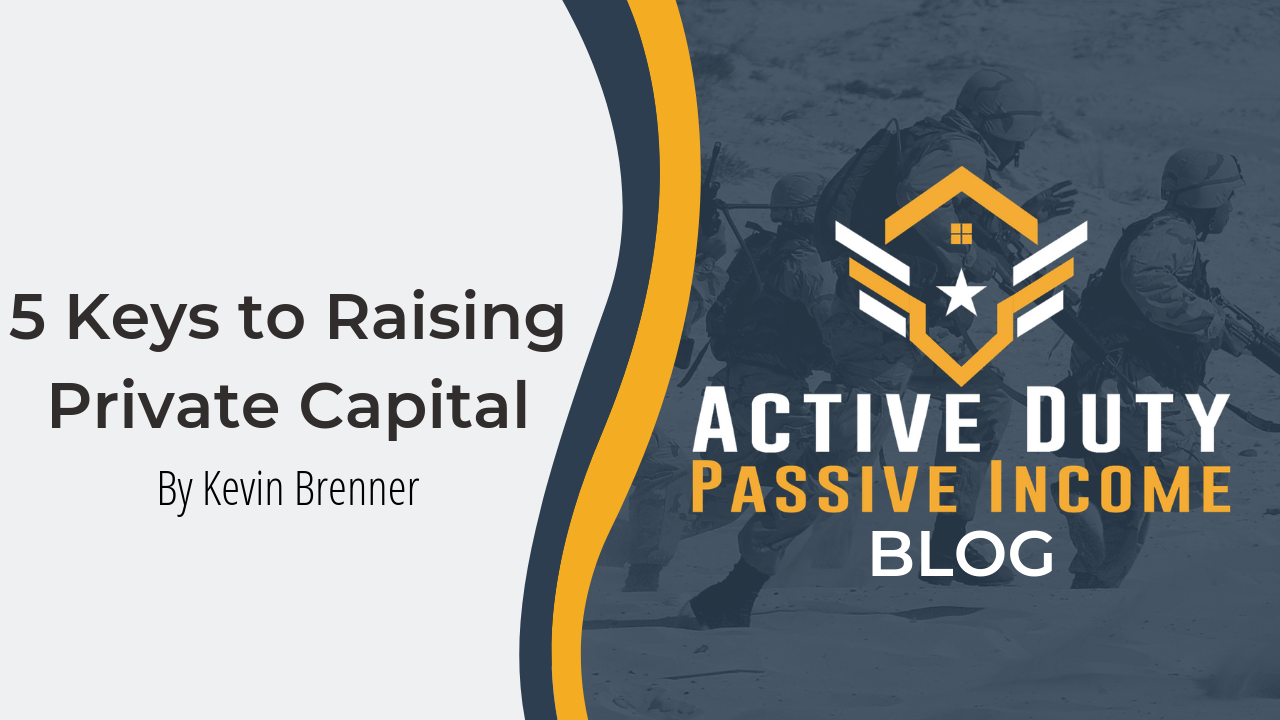
Kevin Brenner, ADPI Hero, Capt, USAF / @investorkev
Raising Private Capital : The Dadism That Got Me Off My Butt
Everyone loves a blog to begin with the phrase, “My Daddy used to say, [insert cheesy life advice tagline here].” Well, strap in everyone, because this next cheesy tagline could be the anecdote that motivates you to get off the couch and into the real estate game.
My Daddy, a fantastic entrepreneur and business owner, used to (and still does) say, “You can hope in one hand and piss in the other, guess which one you’re going to have more of.” Before you run off to the lab to experimentally prove this Dadism (I don’t recommend it, but if you must, wear latex gloves), hear me out. What I mean is that at some point in your investing career, whether you a newbie, or an experienced commercial real estate investor, you will hit a plateau. For a lot of Buy and Hold investors out there, this plateau comes right around the time you apply for your 10th conventional home loan. Or maybe it comes earlier when the bank tells you your Debt-to-Income (DTI) ratio is too high.
So banks won’t lend you money any more. What are you going to do about it? On the one hand, you could hope that the bank will come to its all mighty senses and realize that you know what, you really are a good person at heart and look like a straight shooter who will pay back this loan (good luck with that). On the other hand, you could pee. No wait, that’s not right, don’t do that – Pee is a metaphor people. A metaphor for taking action and being creative to raise private capital to fund your next deal!
Why Banks Suck Sometimes
Banking institutions are the backbone of many real estate investors’ assets. Leverage is a wonderful tool that every investor should take advantage of at some point in their career. How else can you scale your business? Unless you have a supremely rich uncle who is willing to grant you a ton of start up capital, then you will most likely have to lean on the old bank – and your VA Loan is a great place to start.
Banks are successful because they have mastered the art of risk mitigation. Since the early days of Babylon, banks have been shaping the way money is distributed and recycled in nearly every society. Banking institutions have paid for wars, built nations, shaped laws, and influenced nearly every human on the planet in the process. Do yourself a favor and learn how banks really make their money – spoiler alert – it’s not from the meager 5.5% interest rate they are charging you on your mortgage. While I can pull my pants up to my chest and deliver a finger waving rant about the racket of modern banking and fractional lending, I’ll digress to how I learned I needed to begin finding other funding sources for my business.
My lender had just notified me that my DTI was too high and that I’d never qualify for a loan. I was looking at purchasing another quadplex in my market. The problem was, not more than 6 months prior I had purchased my first quadplex using my VA loan. I was in the process of rehabbing it using the BRRRR method. While the rents in some units were double what they were when I purchased, my lender told me that I didn’t have enough seasoning time.
In other words, the bank needed proof that I wasn’t just a lucky landlord who suckered in some tenant into paying super high rent…insulting right? I thought so too. Well you see the bank has rules. And they must be obeyed. I mean they are the one’s lending you the money, so as investors, we are kind of stuck here. So what did I do when my lender served up this devastating news? I went home, sat on my couch, and cried uncontrollably. No not really – instead I got creative and began educating myself on Private Capital.
What is Private Capital?
Private capital is not Hard Money or Cash. It has nothing to do with seller financing. It doesn’t come from your savings account. And it certainly doesn’t come from the bank. Private capital is exactly as it sounds – private. It can come from family and friends. It can come from a co-worker or a business partner. In commercial real estate, private capital comes mostly from accredited or sophisticated investors who put up their funds to get a piece of a large profitable deal. Investors who coordinate and manage these deals are called syndicators and can be regulated by the SEC. I am no syndicator. I am just a guy looking to build a real estate company and expand his rental portfolio to build wealth and achieve financial freedom. If you are like me, then you keep reading to learn the 5 Keys to Raising Private Capital.
1. Find the Deal
It’s pretty hard to rally private investors to your cause when you have nothing to show them. For one, they won’t really take you seriously. It’s much easier if you find the deal first. Show them what you are looking to purchase. Draw up a professional proforma that details the deal and what you plan to do with it. You have to excite potential investors into giving you their hard earned money. Remember, when you are raising private capital, you aren’t, asking for money. Instead, you are providing your investors with an opportunity to make a significant return on their money. Put their money to work – get it out of the low yield savings account and into the profitable real estate game!
2. Find Your Potential Investor
I can’t tell you how many people ask me how I find private capital partners. The honest truth is – I don’t. They find me. That’s why I always want to have a deal in hand to present to any potential investor. Additionally, I’m doing everything I can to expand my network from attending (and hosting) local meetups, to crushing the social media game, to writing blogs (like this one). Every step is a baby step towards one of my quarterly goals. My quarterly goals flow into my annual goals. And my annual goals fill in my 5 year goal of reaching Level I financial freedom. Since you have found a good deal, now all you have to do is blast it out to your network. And before you email me, DM me, or comment telling me that you don’t have a network to blast your deal out to, do me a favor – reach into your pocket and pull out that thin rectangular thing that makes and receives telephone calls and text messages. Whether you know it or not, you are staring at your network. You never know who in your phone’s contacts is thinking about getting into the real estate game. Or maybe they got a sweet bonus at work and don’t feel like putting it in low earning mutual funds. Perhaps someone in your contact list just inherited a whole bunch of money from their rich uncle. Unless you can read minds, then you won’t know. Find the deal, blast it out, and potential investors will find you. I guarantee it.
3. Interview Your Potential Investors
In most cases, your private capital investor is going to be with you for a minimum of 6 months. It all depends on what your strategy is (Fix N’ Flip, BRRRR, Buy and Hold, etc.). I’ve negotiated a 36 month balloon payment with my investor – so he’s on the hook for at most 3 years. It could be more, it could be less. The point is, you need to communicate with your investor and set all expectations ahead of time. The best way to do this is run a Potential Investor Interview (PII). Find out why he or she wants to invest with you. Find out what they are hoping to gain. Inquire where the capital is coming from. Is it liquid cash? Is it coming from a Self-Directed Individual Retirement Account (SDIRA)? What is your potential investor’s risk tolerance? Do they currently own real estate? Communicate your objectives and your timeline with your investor. Both you and your potential investor MUST be on the same page well before closing.
4. Don’t Be Cheap – Negotiate a Win-Win
The quickest way to deter any potential investor is to promise the world and deliver a turd. Don’t do that. As a Deal Provider you are in a unique position of someone who has knowledge about a real estate investment that can accelerate both you and your potential investor’s net worth. With that knowledge, comes a certain level of power. But remember, you can’t execute this deal alone. If you could, you probably would. But you can’t, so your objective should be to negotiate a Win-Win. I can write an entire blog post on different deal structures, and I just might, but for now the best thing you could do is understand that negotiations are fragile and must be cared for. Communicate your objectives with your potential investor. Listen to what your investor is saying to you. Structure a deal that meets both their requirements and your investment goals. Remember, 50% of a good deal is better than 100% of no deal.
5. Check Your Work
In grade school, I would always be the first one to turn in my quiz. I wore it as a badge of honor. I thought the quicker I can get this thing done the quicker I can turn off my brain and take a nap while we waited for the rest of the class. That strategy worked for me until I reached calculus. I learned pretty quickly that I could avoid a lot of potential errors and mistakes by simply checking my work. The same principle applies to your efforts to raise private capital. In this case, however, the person reviewing your work will most likely be your attorney. Even though it might cost you a bit of money, it’s always worth it to have a qualified real estate attorney who specializes in private capital and equity partnerships to review your documentation. Whether you have a simple Promissory Note or a complex Joint Venture Agreement – have an attorney review it. Lawyers are great because they see things through a different lens. They often live in a world where Murphy’s Law is the law of the land and the apocalypse is just around the corner. This is helpful, because you may be able to add some language to your agreement that could offer additional protection in the event of a worst-case scenario. Remember, risk mitigation is the crux of lending money. It doesn’t matter if you are the borrower or the lender. You established a win-win deal to purchase your next real estate investment and that means that you have been entrusted by your private capital partner to mitigate both your own and their risk. Do it right. Hire an attorney.
Private Money for Scalability
Utilizing private capital can help you scale your business beyond your wildest dreams. Private capital is always more favorable than conventional bank loans because of the flexibility it offers the borrower. Try walking into your favorite lender’s office to offer the bank a principle and interest deferred 36-month balloon bridge loan at 7% interest with no prepayment penalty and let me know how it works for you. If you aren’t instantly laughed out of their office then please do me a favor and share their contact information with me!
Kevin Brenner is an Active Duty Air Force Captain, ADPI Hero, REIA creator, blogger, and an active multifamily investor. You can reach out to him through the ADPI Facebook group!








